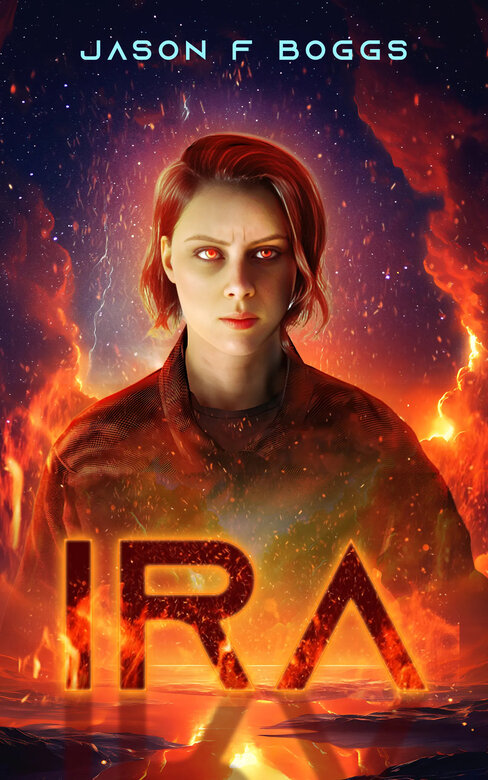
Packed with dreams of vengeance, intergalactic scheming, and even some sci-fi levity, Ira by Jason F. Boggs is an unpredictable new chapter in the Devil’s Dragon series.
After her epic defeat at the hands of Nelson, Alene, Wong’s Pirates, and an alliance of fearless humans, the villain Ira Bilis has fled to the shelter of the stars, furiously plotting her next move in a war she refuses to abandon. After following a quantum-jumping orb through a sungate to a new star system, Ira finds an enigmatic but untrustworthy ally who sought her out to join forces and rule at her side.
Magnus, the mysterious alien lord, has the weaponry and knowledge Ira needs to navigate the galaxy and enact her revenge, but an ancient megalomaniac trying to rebuild an empire makes for a strange bedfellow. Unbeknownst to Ira, Magnus has identified her as the ideal mate for his eventual reincarnation, one with the fortitude to conquer at all costs.
Still recuperating from their victory over President Freeman and the New Era, Nelson and Alene have been tasked with the seemingly impossible – find Ira’s warship somewhere in the vastness of space and eliminate the threat once and for all. Navigating their emotional tangles and an uncertain future as leaders or lovers, this tension-filled duo represents the good guys of this series, but as the novel’s title implies, the focal point is the antagonist’s single-minded exploits – an uncommonly refreshing shift in the genre.
As wildly creative and distant as this cosmic drama may seem, human fallibility and pride are still central to the plot, as are recognizable themes, including the long-term effects of trauma, the allure of authoritarianism, the insidious nature of hate, and the complex evils of colonialism. To accentuate these ideas, the narration occasionally slips into tangential asides, which can feel heavy-handed and somewhat disruptive to the flow of the story without being fully integrated in dialogue or plot revelations, but overall Boggs skillfully integrates complex issues into this space-faring epic.
While Ira herself is a compelling focal point for the novel, many of the peripheral characters remain undeveloped, whether they are archetypal henchmen or cowering crew members, leaving only Magnus and Ira as an isolated pair of villains. Ira has an unnerving psychopathic edge, swinging from violently unhinged to obsessively suspicious, but her origin story as an aspiring tyrant can feel overly simplified at times, occupying two extremes with little else in between. Generally, the prose is blunt and plot-driving, with a major emphasis on pacing and action rather than descriptive passages, which could be further fleshed out, especially in terms of character development.
From a technical standpoint, the text needs a fair amount of work, with grammatical errors, disjointed syntax, and inconsistent dialogue formatting. The writing also feels rushed, with characters making snap decisions that accelerate the story, but also compromise believability, with a conspicuous lack of technological exposition on sci-fi tech. As a standalone installment, there are some significant gaps in the narrative that require too much suspension of disbelief.
Those issues aside, this is a thoroughly imaginative read that expands the scope of the series considerably. Further expansion of world-building and character nuance would help the novel take full advantage of this fascinating villain, but as it stands, this is a thrilling continuation of an innovative series.
Book Links
STAR RATING
Design
Content
Editing
Get an Editorial Review | Get Amazon Sales & Reviews | Get Edited | Get Beta Readers | Enter the SPR Book Awards | Other Marketing Services






















Leave A Comment